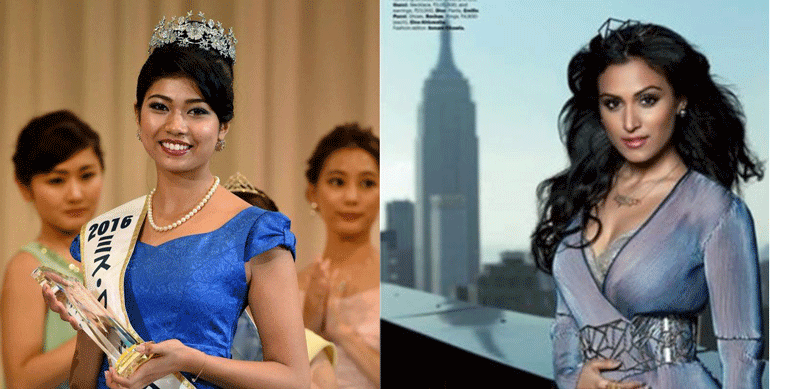COLUMN: Society needs to see more women achievers in stereotype-defying ads.

NEW YORK: It’s not like the Libertarian Party nominee for president Gary Johnson not having a clue about what’s Aleppo. The condemnation and ridicule heaped on Johnson apart, that’s just plain ignorance and unpreparedness on the part of the former governor of New Mexico, who hopes to do a David vs. two Goliaths act to reach the White House. It’s certainly not long-standing research which has deciphered that boys get intelligence from their mothers. That’s science, more to do with the X chromosome.
Racism too stems from ignorance. Might be inherited from parents, be part of one’s sub-consciousness. But it’s also much more: calculated, ugly hate-mongering, to warp, force society to one’s pre-conceived notions. Like, a Nina Davuluri cannot be Miss America because she is dark-complexioned, not a blonde and blue-eyed Caucasian. Or, a Priyanka Yoshikawa cannot be Miss Japan. That, like Davuluri, with her Indian roots, Yoshikawa’s despicable; her inter-race has tarnished the image of pristine Japanese womanhood, haters would reckon.
The hatred pouring on social media in Japan over Yoshikawa, who has an Indian father and a Japanese mother, is not rabid and absolutist as when last year the country selected Ariana Miyamoto – who has an African-origin father and Japanese mother – as Miss Japan Universe. Some of the cussing and indignation on twitter apart, two years in a row with a ‘haafu’, as the racist Japanese society terms ‘non-pure’ Japanese residents, seems to have broken the backs of most racists. They seem to have thrown in the towel, at least for now, resigned to globalization wreaking havoc with their culture.
The Japanese have their leaders and experts to blame in part for the resistance to accept non-Japanese graciously, despite the country’s alarming drop in population and ageing work force.
The former Japanese Prime Minister Tarō Asō had described the country as being a nation of “one race, one civilization, one language and one culture”. Last year, Ayako Sono, a education reform expert, had advocated segregation and apartheid in society, to allow ghetto neighborhoods dividing ethnicities to flourish. Japanese are averse to renting houses to non-Japanese. Even today, some motels, bathhouses and night clubs don’t allow foreigners in.
But, of course, the Japanese want all the foreigners in the world, with their myriad currencies, to come attend their Olympic Games, in 2020. Help rebuild the country financially.

Three years ago, Davuluri, who’s studying to be a cardiologist, was the object of racist and xenophobic drivel, from not only in the United States, but India too. If a lot of netizens in the US were sneeringly contemptuous by remarking how an “Arab”, “Miss Al-Qaeda”, ‘Miss 7-11” could become Miss America, the ugly, stupid Indians in India tried to outdo that by their low take on the situation, befuddled as to how: “Ugly Andhru”, “Indian rag pickers are more beautiful than her,” A real nigga woman”, “kallumal koilewale ki ek lauti, kali bhasand bhais lag rahi hai”, “Miss Somalia”, could possibly be Miss American, in the land of White women.
Read Sujeet Rajan’s column on the discrimination faced by Nina Davuluri after she was crowned Miss America: http://www.americanbazaaronline.com/2013/09/16/davuluri-miss-america-us-india-hate-dark-complexion/
But here’s the big difference this time around when the news broke of Yoshikawa becoming Miss Japan.
While the racist antagonism is muted, but nevertheless present, in Japan, towards their new beauty queen, there is hardly any uproar from the bigots in India. Why’s that?
The only reason I can deduce is that Yoshikawa, despite being as half-Indian as Davuluri, is not dark-complexioned. She looks more Japanese than Indian. Imagine, if like Ariana Miyamoto, Yoshikawa was dark-complexioned too, the racist cowards of India would have had yet another gala time reveling in filth, belching putrid comments.
India’s haven of intolerance has been rising in the last few years, violently targeting not just African Americans and people from the North-East of India, in metropolitan cities like Delhi and Bengaluru, but also against eating habits, like consuming beef, disdain for western attire and dress. The culture minister of India, Mahesh Sharma, recently advised foreign women not to wear skirts in the country. Sharma amended that controversial statement later, even refuted it saying he meant only in temples, but the damage was done. The racists and misogynists on social media were jubilant, openly championed Sharma.
In July, on a vacation to India, converting some foreign exchange at the counter of Thomas Cook, at the Indira Gandhi International Airport, in Delhi, I was shocked – but really, after an instant not so, with the realization that I’m back in India, after all – when the men and women staff manning the booth started derisive banter, abusing in Hindi a Caucasian man who was also converting some currency there.
For a moment I thought of intervening in Hindi, making some pointed remarks to the staff, express my disgust. But I abstained. My family was waiting for the transaction to be completed; we had just got off a long flight from New York, the kids were irascible. I also didn’t want the visitor to be humiliated, in case he caught on to the drift of the conversation. I could only imagine what those young men and women at Thomas Cook would chuckle about if an African American would stop by for business.
It’s not India. If there’s any doubt that complexion matters in the US, when it comes to especially women, one has to look at what happened when Davuluri ended her one-year reign, in 2014, handed her crown to the new Miss America, Kira Kazantsev. The latter, like Davuluri, was also a second generation immigrant, born to parents from Russia. But this time around, there was no protest, the haters were silent on social media. Perhaps, like Yoshikawa was ‘passable’ for the racists in India, a white woman, despite being of Russian-origin, was ok for racist Americans.
The fact is that society in India and the US, just like in Japan, is not going to change suddenly: racism across the globe is escalating, and has to be countered constantly. Jingoism is increasing in India, might escalate rapidly in the US If a person like Donald Trump assumes office. People of color, especially immigrants of color, would be looked down upon by white supremacists. Racists would come out in the open confidently, distort decades of patient work by a tolerant society, destroy with impunity the values of a humane nation.
Women, despite any amount of success, are stereotyped. Take this for example: Davuluri was asked by an Indian man in the US if she knew how to cook, after she became Miss America. Recent research in the US shows that while Olympic male athletes are asked how fast they are, how high or long they can jump, when it comes to women athletes, it’s usually curiosity if they are single or not.
What is perhaps required to change society is to portray more women as achievers in advertisements, define them with stereotype-defying roles.
The beer brand Dos Equis has announced a new model, Augustin Legrand, to act as their ‘Most Interesting’ man in the world ads. But there are no ‘Most Interesting’ woman in the world ad going around. Perhaps it’s time to get one going, globally, or at least in countries like the US, India and Japan, strong democracies all, which need to change perception of women.
Davuluri had said aptly in an interview after her success: “I’ve always viewed Miss America as [being] a ‘girl next door,’ and I believe the ‘girl next door’ is evolving as diversity in America evolves. She’s not the same person she was ten years ago and she won’t be the same person come ten years down the road, so I wouldn’t want to change someone’s appearance.”
Perhaps, to really change the next generation of society, ensure that prejudice, racism is eradicated, women treated with equal respect, more women need to be shown as achievers in ads. A Nina Davuluri or a Priyanka Yoshikawa as faces of modern society, icons of globalization, achievers and doers, would enable a new generation to believe in ethnicity, not scorn it.
(Sujeet Rajan is Editor-in-Chief, The American Bazaar. Follow him @SujeetRajan1)



